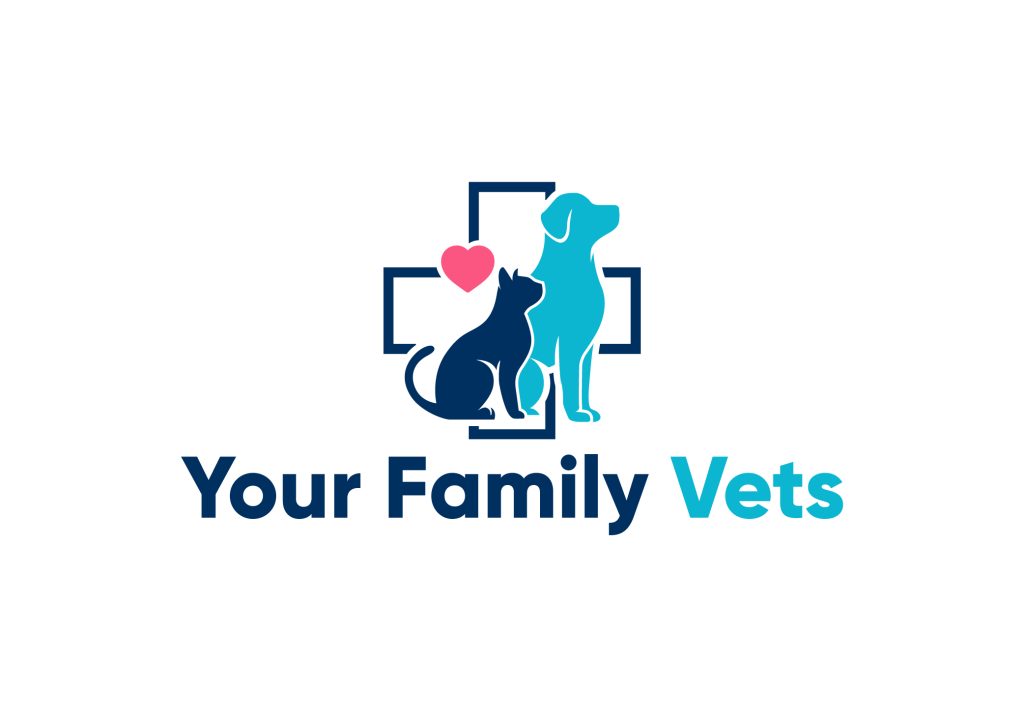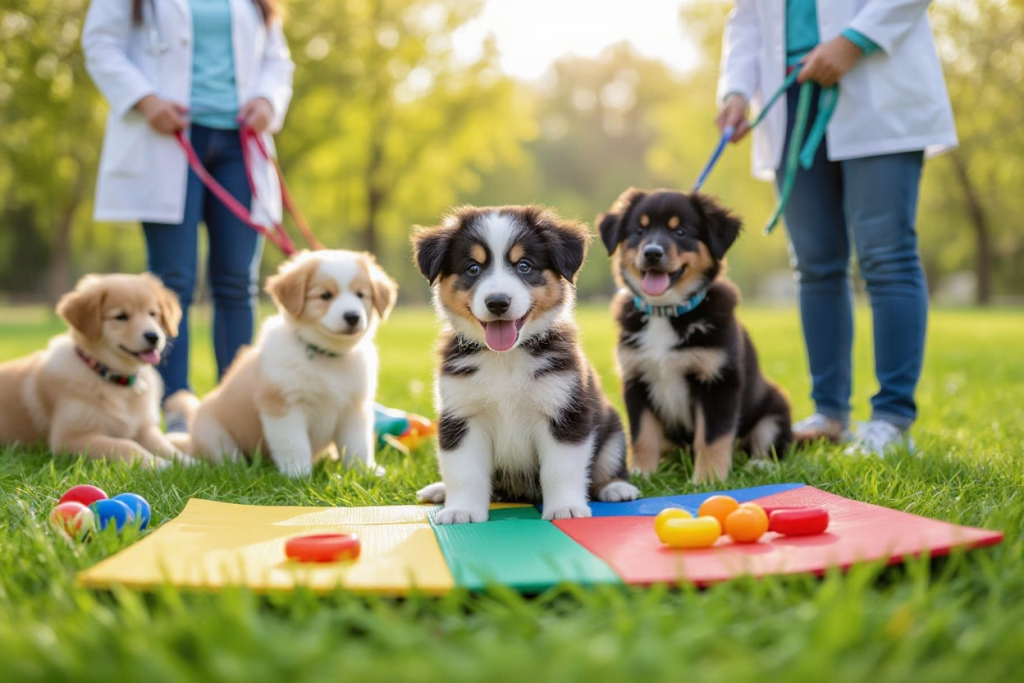vet guidance: you should begin gentle socialisation and basic training early to shape confident, well-behaved dogs; balance new experiences with timely vaccinations to reduce the risk of infectious disease, and expose your puppy to sights, sounds and safe people or dogs for lasting behavioural benefits. As a local authority, YF Vets can advise on safe timing, common mistakes to avoid and booking your first vaccination or consultation.
Key Takeaways:
- Early socialisation = positive, varied exposure to people, places, sounds and other animals; vital for confident puppies in Harrogate & Wetherby and aligns with trusted puppy training advice UK.
- Follow vet guidance on timing: start gentle, controlled social experiences after the first vaccine and avoid high-risk areas until the full course is complete — book vaccinations: yfvets.co.uk/vaccinations/.
- Local tips for Harrogate & Wetherby owners: short, calm walks at quieter times, gradual sound desensitisation, and supervised meetings with vaccinated dogs to build positive associations.
- Avoid common mistakes: forcing interactions, inconsistent training, exposing pups to unvaccinated dogs or overcrowded venues before their primary vaccines, and using punishment for fear-based reactions.
- Get professional support early — arrange your first vet visit or a puppy consultation and consider a Pet Wellness Plan for ongoing care: consultations | pet wellness plan.

The Foundation of Healthy Puppies: Defining Socialisation
Socialisation means exposing your puppy to people, animals, environments and sounds so they form positive associations during the sensitive window between 3–14 weeks. You create long-term behaviour patterns with short, reward-based exposures—handling, car rides, groomer visits, different surfaces and calm meetings—prioritising frequent, gentle sessions rather than prolonged or stressful encounters.
The Role of Socialisation in a Puppy’s Development
Early exposures shape neural pathways for curiosity, coping and learning; fear responses and social preferences are formed fastest in the first weeks. You can reduce future anxiety and aggression by providing varied, positive experiences and coordinating timing with your vet so socialisation complements your puppy’s vaccination schedule and health checks.
Key Socialisation Experiences for New Puppies
Introduce adults, children, people in uniforms, calm vaccinated dogs, different surfaces (gravel, metal, stairs), car journeys, crate time, grooming handling and household noises. Aim for several short (<5-minute) positive sessions daily and practise brief separations. Avoid off-lead parks and high dog-density areas before full vaccinations to minimise infection risk.
Practical steps you can take: carry your puppy into busy streets in Harrogate (Valley Gardens) or Wetherby high street to expose them safely, arrange calm meet-and-greets with vaccinated dogs, and practise handling 2–3 times daily for 60–90 seconds (paws, ears, mouth). Use high-value treats to create positive links. If you need local support for puppy socialisation Harrogate or puppy socialisation Wetherby, seek puppy training advice UK from YF Vets or book a consultation to avoid setbacks from premature high-risk exposure.
Expert Insights: Aligning Training with Vaccination Schedules
Match your early training steps to the standard vaccine timeline: first primary vaccine at about 8–9 weeks, the booster at ~12 weeks, and functional protection generally reached ~1–2 weeks after the booster. You can begin low-risk handling, sound desensitisation and short positive-reward sessions before full immunity; avoid high-traffic parks and off-lead play with unknown dogs until your pup has completed its course. Use your first vet visit puppy to get a bespoke plan tied to your puppy’s health and local disease risks.
Safe Socialisation Tips for Vaccinated vs. Non-vaccinated Puppies
Vaccinated puppies may meet other vaccinated dogs in controlled settings after the booster, while non-vaccinated pups should get household, car-ride and visitor exposures only; start with handling, gentle surface walks and brief, calm encounters with fully vaccinated adult dogs. Keep sessions short (3–10 minutes) and aim for 3–5 new, positive experiences daily; avoid dog parks and puddles until immunity builds. Perceiving the balance between social exposure and disease risk will guide each step of your plan.
- puppy socialisation Harrogate
- puppy socialisation Wetherby
- puppy training advice UK
Understanding the Critical Period for Puppy Training
Between roughly 3–14 weeks your pup is highly receptive to people, sounds and environments, with the steepest learning from about 3–12 weeks; missed positive exposures increase the risk of later fear-based behaviours. Plan short, frequent sessions (5–10 minutes, several times daily), include handling, basic cues and gentle noise playbacks, and introduce single new stimuli per session so your puppy builds confident associations.
Practical examples: handle paws, ears and mouth for 2–3 minutes, three times daily; take a 5–10 minute car ride and a short walk on different surfaces every other day; expose your puppy to four new, calm people across a week; use a puppy class after the second vaccination for structured socials. Track progress in a notebook or photo log—if avoidance or freezing appears, reduce intensity and pair the stimulus with high-value treats to rebuild positive links.

Navigating Local Opportunities: Socialisation in Harrogate & Wetherby
Make the most of Harrogate and Wetherby green spaces to build confidence during the key social window between 3 and 14 weeks; aim for multiple short exposures (5–10 minutes, 2–4 times daily) to varied sights and sounds. Valley Gardens and RHS Harlow Carr offer controlled, scenic routes in Harrogate, while Wetherby Ings and riverside paths give quieter riverside experiences. YF Vets recommends planned, paced outings as part of your puppy socialisation Harrogate and puppy socialisation Wetherby strategy.
Exploring Safe Walks and Outdoor Spaces
Choose off-peak times and mapped routes: try early mornings at Valley Gardens or weekday afternoons on Wetherby’s riverside to avoid busy dog hotspots. Use a carrier or sling for very young pups before full vaccination, and schedule 5–15 minute graded exposures—traffic noise, bicycles, and café terraces—then build duration. Steer clear of high-density, unknown dog areas before vaccinations to reduce infectious risk while still achieving varied environmental learning.
Creating Positive Interactions with Other Pets and People
Arrange brief, supervised meet-and-greets with calm, vaccinated adult dogs—ask owners about vaccination status beforehand—and keep first approaches at 2–3 metres, reducing distance only if both dogs show relaxed body language. Use high-value treats, soft praise and 2–5 minute intervals, repeating 2–3 times daily. Apply these steps as part of your puppy training advice UK routine and avoid forcing contact with unknown or excitable dogs.
Start introductions with parallel walks for 3–5 minutes at a comfortable distance, then allow a 30–60 second nose-to-nose sniff if both dogs’ tails and posture are loose; step back and reward immediately if you see whale-eye, tucked tail, lip licking or stiffening. Swap roles with the other owner so your puppy experiences neutral territory, and end sessions on a positive cue—sit, treat, gentle praise—so each interaction reinforces calm, repeatable behaviour.
Common Pitfalls: Avoiding Mistakes in Early Training
Over-socialisation and Under-socialisation Risks
Socialisation largely happens in the 3–14 week window; too little exposure leaves your puppy fearful and reactive by adolescence, while too much, too fast can overwhelm and create long-term anxieties. Balance structured meetings with calm, vaccinated dogs and short, positive exposures to noises, people and surfaces. Avoid busy dog parks until after your puppy’s full vaccination course (typically first vaccine around 8 weeks, booster at 12 weeks) and use controlled puppy classes or one-on-one introductions in Harrogate and Wetherby instead.
Misunderstanding Puppy Body Language and Signals
Puppy signals are subtle: a wagging tail can mean excitement or arousal, whale eye, lip licking and freezing often signal stress, and a play bow differs from a stiffened body. Misreading these leads you to reinforce anxiety or punish play that’s actually fearful escalation, increasing bite risk; pause interactions when you see stress signs and use short, rewarded exposures to rebuild confidence rather than forcing contact.
Escalation often follows a pattern: avert glance → yawning/lip lick → stiffen → growl → snap. Video a recurring incident to spot triggers (grooming, children, specific handling). Teach your household and visitors to stop at the first stress cue and offer alternatives like treats or distance; consult a vet behaviourist or trainer if you see repeated escalation or any unprovoked bites to prevent injury and reverse the pattern.
Summing up
As a reminder, early socialisation and gentle training give your puppy the best start — you should introduce new people, places and sounds safely while following vaccination guidance. Trust YF Vets in Harrogate and Wetherby to advise on timing and techniques; book your puppy vaccination or consultation at https://yfvets.co.uk/vaccinations/ or https://yfvets.co.uk/consultations/ to get personalised support.
FAQ
Q: Why are early training and socialisation important for my puppy?
A: Early training and socialisation shape a puppy’s behaviour and confidence during the sensitive developmental window (generally up to around 16 weeks). Positive, varied experiences now reduce the risk of long‑term fear, reactivity and separation problems and make later obedience training far easier. Starting early also helps your puppy learn acceptable behaviour around people, other animals and common UK environments, which is necessary for safe, happy life in Harrogate and Wetherby.
Q: What does puppy socialisation include and how should it be done?
A: Puppy socialisation means exposing your puppy, in a calm and positive way, to different people, animals, surfaces, sounds, objects and situations so they form good associations. Key elements: gentle handling (including vet and grooming checks), meeting a range of friendly people and well‑vaccinated dogs, short car trips, introduction to household noises, and training basic cues (sit, recall, leave). Use small, frequent sessions with rewards, stop if the puppy shows clear stress, and build exposure gradually to avoid overwhelming them.
Q: From a vet’s perspective, when is it safe to socialise my puppy around other dogs and public places?
A: Vets advise beginning safe socialisation at home and in controlled settings as soon as you bring the puppy home. Contact with other dogs and busy public places should follow the vaccination schedule: initial social contact can start after the first vet check but visits to high‑risk dog areas are best delayed until after the full primary vaccination course and your vet confirms adequate protection. For personalised timing and to book vaccinations see Vaccinations and arrange your Consultation.
Q: How can Harrogate & Wetherby owners socialise puppies safely around town and locally?
A: Use quiet times for short walks on varied surfaces, introduce local daily sounds (markets, tractors, trains) at a distance and reward calm behaviour, and arrange meetups with known, vaccinated dogs in gardens or private spaces. Attend local puppy classes or supervised play where staff check vaccination status, practise car rides and vet handling, and build positive experiences with people of different ages and appearances. Consider a vet‑led plan or the Pet Wellness Plan to structure vaccine and check‑up timing for safer outings.
Q: What common mistakes should new owners avoid and how can YF Vets help?
A: Common errors are rushing large or uncontrolled exposures too soon, using punishment or aversive tools, inconsistent rules between family members, delaying vaccinations or first vet checks, and ignoring early signs of fear. YF Vets can help with a tailored vaccination schedule (Vaccinations), puppy checks and training advice during a Consultation, ongoing wellness support via the Pet Wellness Plan, and routine services such as Neutering. Book your puppy vaccination or consultation to get a personalised plan for Harrogate & Wetherby puppies.

